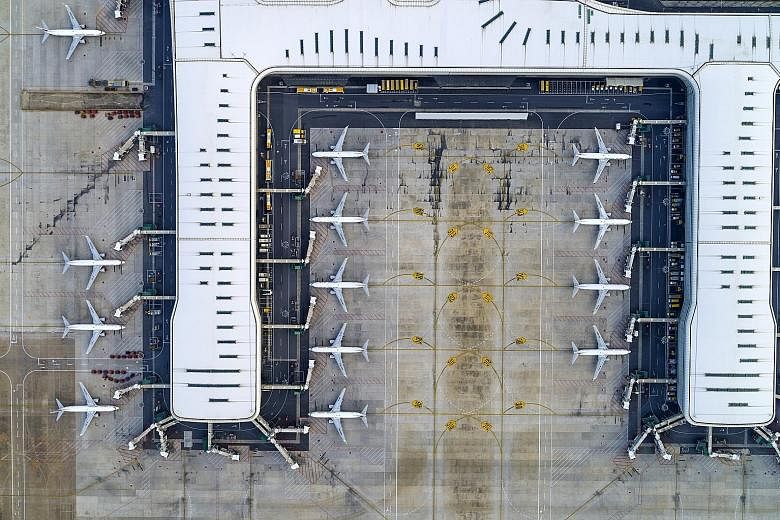NEW YORK • On Sept 15, an Indonesian flight carrying 307 passengers and 11 crew to the northern city of Medan momentarily veered off the runway after landing, sparking an investigation by the country's transport safety regulator.
It found the pilot had flown less than three hours in the previous 90 days. The first officer had not flown since Feb 1.
The incident underlines an emerging risk from the coronavirus pandemic: Pilots are not getting enough opportunity to fly because airlines have grounded planes and scaled back operations due to a slump in demand for air travel.
In its preliminary report, Indonesia's National Transportation Safety Committee said the pandemic has made it harder to maintain pilot proficiency and flying experience.
The Lion Air aircraft involved was an Airbus SE A330, one of 10 in the carrier's fleet. Because Lion Air does not have a simulator for the A330, its pilots are trained at third-party facilities in Indonesia, Malaysia and Singapore.
Covid-19 travel restrictions have made those harder to access. "Regular flying keeps your mind in the cockpit," said Captain Mohan Ranganathan, an aviation safety consultant who was an adviser to India's Directorate-General of Civil Aviation.
"Being away from flying for such a long time brings in some complacency. Add loss of income, uncertainty about jobs or the future of the airline, that brings in additional stress. With an increase in stress levels, proficiency drops."
Analytics company Cirium says almost a third of the world's passenger jets remain in storage - parked in the centre of Australia and the United States' Mojave Desert.
While there has been a recovery in domestic travel in larger markets such as China, international traffic is way off pre-pandemic levels because of border restrictions and mandatory quarantine, a big deterrent to travellers.
Thousands of pilots have been laid off or furloughed, and those still in work are flying a lot less because there is so little demand.
The return to the skies of Boeing's 737 Max could add another layer of complexity. The jet was grounded worldwide in March last year after two fatal crashes, but was last month cleared by the US Federal Aviation Administration with an extensive package of fixes.
Pilot rustiness was also cited by Europe's top aviation safety official as a possible factor in the crash of a Pakistan International Airlines (PIA) plane in Karachi in May that killed all but two of the 99 people on board. Nobody was injured in the Lion Air runway incident.
Said European Union Aviation Safety Agency executive director Patrick Ky in September regarding the PIA flight: "The pilots did not seem to be as fluent in the way they were conducting their flights as they should have been.
"If you haven't flown for three months, six months, you need to be retrained in some way in order to come back."
That concern is shared by others. At an event in October, Singapore's central bank chief Ravi Menon spoke about the lingering effect Covid-19 will have on the aviation industry and pilots who have not flown for long periods.
"It's not like picking up after taking two months off. When you take two years off, it's very different," he said.
In an interview with Bloomberg Television last week, the International Air Transport Association's vice-president for the Asia-Pacific, Mr Conrad Clifford, said the industry group has been looking at creating special travel bubbles so pilots can access simulators to ensure they can remain current. "I'm glad to say that governments are doing something about this," he said.
Additionally, the International Civil Aviation Organisation has called for flight crew to be recognised as key workers so they can use travel bubbles and access training facilities, including simulators, to maintain certifications, experience and proficiency.
Captain Ian Cheng, senior vice-president of flight operations at Scoot, Singapore Airlines' low-cost carrier, said its pilots are being kept engaged with simulator sessions and meetings to be updated on latest developments.
"Because of the low amount of flying, it's essential to keep proficiency levels up," he said.
According to Capt Ranganathan, it will take about a month of regular flying for pilots to get their confidence and skill levels back, along with lots of training.
"When you are not focused, decisions can get delayed," he said. "Just a few seconds can make a difference between a safe flight or an accident."
BLOOMBERG

